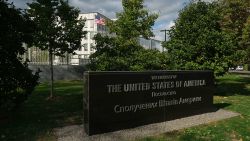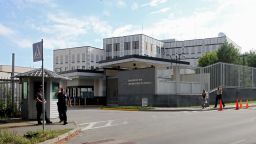President Joe Biden discussed options for bolstering US troop levels in the Baltics and Eastern Europe with his top military officials during a briefing at Camp David on Saturday, according to a senior official.
The briefing, which Defense Secretary Lloyd Austin and Chairman of the Joint Chiefs of Staff Gen. Mark Milley attended virtually, included the discussion of troop levels as well as updates on the latest intelligence and ongoing talks with allies on their plans to respond should Russia invade Ukraine, the official said.
The New York Times first reported on the options being presented at the briefing and reported that Biden is expected to make a decision as early as this week.
One option under consideration is moving between 1,000 to 5,000 troops, according to a senior defense official, and is intended both to shore up Eastern European and Baltic allies and to have them available to help get American citizens out, if necessary.
According to the White House, national security adviser Jake Sullivan and counselor to the President Steve Ricchetti joined Biden in person at Camp David, with other officials participating via secure video conference.
“President Biden was briefed on the current state of Russian military operations on Ukraine’s borders and discussed both our ongoing efforts to de-escalate the situation with diplomacy and our range of deterrence measures that are being coordinated closely with our Allies and partners, including ongoing deliveries of security assistance to Ukraine. President Biden again affirmed that should Russia further invade Ukraine, the United States will impose swift and severe consequences on Russia with our Allies and partners,” a readout of the briefing said.
CNN reported Friday that the Defense Department was working on a series of military options for Biden’s approval that could be activated to beef up the US military presence in eastern Europe as a deterrence if Russian invades Ukraine, according to two defense officials. “We are exploring a wide range of options on how we would bolster our allies militarily,” the first official said. These options would also likely be supported by sanctions.
The goal of any military reinforcement in eastern Europe would be to provide deterrence and reassurance to allies. The options could include “movement of assets and forces already in Europe and also assets and forces available outside of Europe,” the official said last week. A Russian invasion “certainly would be one trigger,” for US troops and assets to move. But some forces might be used in exercises and other training scenarios as well. And any arms sales would be considered somewhat a separate matter from troop movements.
Broadly, the US military goal would be to “meet the capability” NATO allies in the region are asking for, the official said. US forces could operate, as they already do, unilaterally in Europe, but could also operate under existing NATO command structures.
Additionally, US special forces continue to assist in the training of Ukrainian Special Operations Forces inside Ukraine. “Our ongoing training mission in Ukraine plays a large role in the development of Ukrainian Special Operations Forces through regular validation training exercises” a spokesperson for US Special Operations Command Europe told CNN.
“These efforts to enhance Special Operations Forces capabilities promotes regional stability. This would not be possible without the tremendous support of the Ukrainian government and the Ministry of Defense leadership. Specifically, SOCEUR is focused on immediate needs training and Ukrainian SOF (UKRSOF) staff development to build capacity of Ukraine’s special forces as they prepare for deployment. In addition, we emphasize tactical level training and leadership development. Finally, we assist in the certification of UKRSOF through advising during their participation in national and multinational exercises.”
This story has been updated with additional information.
























